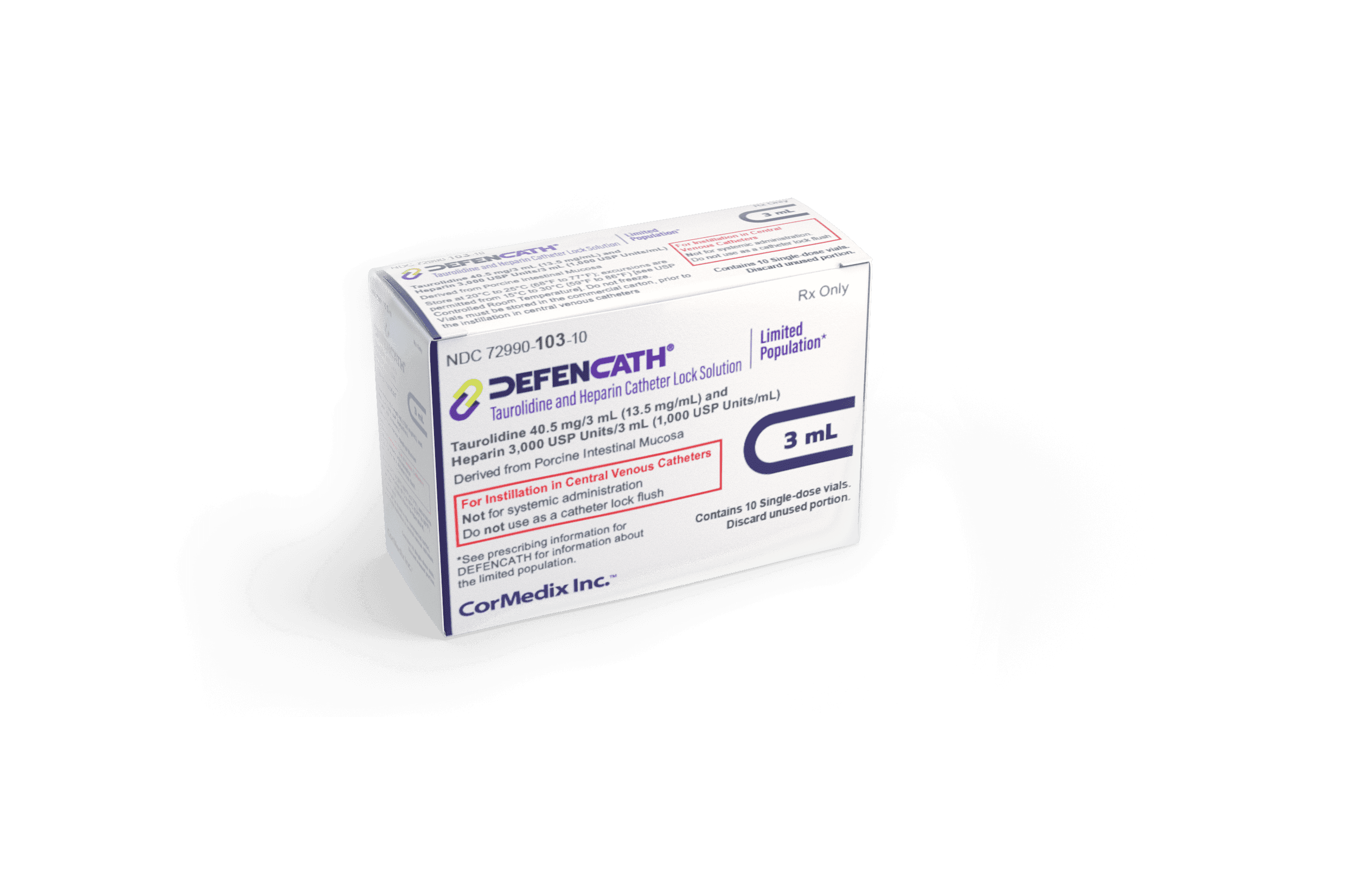

Protect the central line from end-to-end
with a first-in-class catheter lock solution (CLS)
*Per in vitro studies with unknown clinical significance.
†No known risk of antimicrobial resistance shown in in vitro studies.

Not actual size.
What is DefenCath® (taurolidine and heparin) catheter lock solution?
DefenCath is the first and only CLS with taurolidine and heparin1,2
It is the only CLS with potent, antimicrobial activity against a broad spectrum of harmful and drug-resistant pathogens that can form throughout the CVC.1-3
The following in vitro data are available but their clinical significance is unknown. Taurolidine has been shown to be active against most isolates of the following microorganisms1:
‡ Pathogens include gram-positive bacteria: Staphylococcus aureus (including methicillin-sensitive Staphylococcus aureus [MSSA] and methicillin-resistant Staphylococcus aureus [MRSA]), Staphylococcus epidermidis, and Enterococcus faecalis; gram-negative bacteria: Escherichia coli, Klebsiella pneumoniae, Pseudomonas aeruginosa, and Serratia marcescens; and fungi: Candida albicans and Candida glabrata.
A CLS with taurolidine + heparin
Taurolidine acts as a broad-spectrum antimicrobial, by1,3§:
- employing a non-specific mechanism of action that causes damage to microbial cell walls1
- inhibiting adherence of microorganisms to biologic surfaces, which is the first step in biofilm formation which may occur within 3 days of catheter placement1,4,5
Heparin is an anticoagulant that helps with maintaining catheter line patency.1,6
Along with the anticoagulant effects of heparin, taurolidine has antimicrobial activity against gram-positive and gram-negative bacteria as well as clinically relevant fungi, with no known antimicrobial resistance1,2§
For more information on the molecular structure of taurolidine, please see the full Prescribing Information.
Mechanism of action (MOA) of DefenCath
The following in vitro data are available but their clinical significance is unknown. Taurolidine has been shown to be active against most isolates of the following microorganisms1:
§Pathogens include gram-positive bacteria: Staphylococcus aureus (including methicillin-sensitive Staphylococcus aureus [MSSA] and methicillin-resistant Staphylococcus aureus [MRSA]), Staphylococcus epidermidis, and Enterococcus faecalis; gram-negative bacteria: Escherichia coli, Klebsiella pneumoniae, Pseudomonas aeruginosa, and Serratia marcescens; and fungi: Candida albicans and Candida glabrata.
Although the clinical significance is unknown, DefenCath® (taurolidine and heparin) catheter lock solution has a nonspecific mechanism of action with broad in vitro activity against most isolates of the following common microorganisms1,4:
Gram-positive bacteria1
- Staphylococcus aureus (including methicillin-sensitive Staphylococcus aureus (MSSA) and methicillin-resistant Staphylococcus aureus (MRSA))
- Staphylococcus epidermidis
- Enterococcus faecalis
Gram-negative bacteria1
- Escherichia coli
- Klebsiella pneumoniae
- Pseudomonas aeruginosa
- Serratia marcescens
Fungi
- Candida albicans1
- Candida glabrata1
- Candida auris4*
*Candida auris in vitro data were not submitted and reviewed by the FDA

Speak with a representative
Have questions about DefenCath? Open the form below to request a call with a representative.
Open formIMPORTANT SAFETY INFORMATION (cont'd)
CONTRAINDICATIONS
DefenCath is contraindicated in patients with:
- Known heparin-induced thrombocytopenia (HIT).
- Known hypersensitivity to taurolidine, heparin or the citrate excipient (components of DefenCath), or pork products.
WARNINGS AND PRECAUTIONS
- Heparin-Induced Thrombocytopenia (HIT): HIT was reported in patients using heparin, a component of DefenCath, as a catheter lock solution. If HIT occurs, discontinue DefenCath and institute appropriate supportive measures.
- Drug Hypersensitivity: Drug hypersensitivity reactions have been reported in patients using heparin, a component of DefenCath, as a catheter lock solution. If a hypersensitivity reaction occurs, discontinue DefenCath and institute appropriate supportive measures.
ADVERSE REACTIONS
The most frequently reported adverse reactions occurring in ≥2% of patients using DefenCath as a CLS were hemodialysis catheter malfunction, hemorrhage/bleeding, nausea, vomiting, dizziness, musculoskeletal chest pain, and thrombocytopenia.
Indications and Usage
LIMITED POPULATION: DefenCath® is indicated to reduce the incidence of catheter-related bloodstream infections (CRBSI) in adult patients with kidney failure receiving chronic hemodialysis (HD) through a central venous catheter (CVC). This drug is indicated for use in a limited and specific population of patients.
Limitations of Use
The safety and effectiveness of DefenCath have not been established for use in populations other than adult patients with kidney failure receiving chronic HD through a CVC.
Please see the full Prescribing Information.